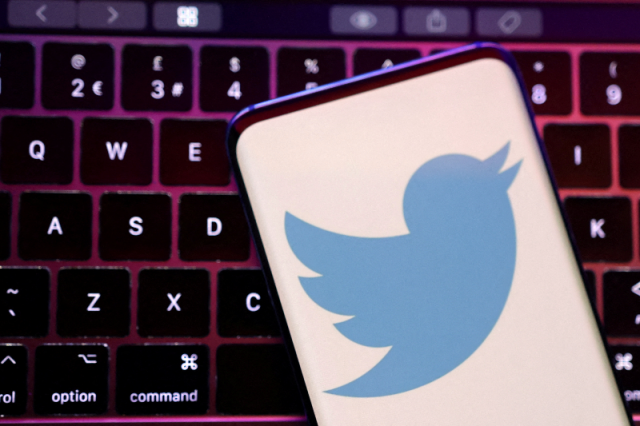
- LGBTQ+ Africans report rise in hate speech on Twitter
- Elon Musk says hate on the platform has fallen
- Rights groups offer digital safety training, counseling
NAIROBI/LAGOS (Thomson Reuters Foundation) — LGBTQ+ rights groups across Africa said they are offering online safety training and trauma counseling to users after seeing a rise in hate speech since Elon Musk took over the platform.
Campaigners from Ghana to Nigeria and Uganda fear the recent increase in anti-gay posts on Twitter – which included people being outed, vilified, blackmailed and even threatened with death – will drive LGBTQ+ Africans off the microblogging site.
“Twitter has become a really important forum for the LGBTQ community in many African countries. Even with all the increasing hate, we simply can’t stop using it,” said Danny Bediako, founder of Rightify Ghana, an LGBTQ+ rights group.
“It has become a place where we have a voice, where we can speak our truth and get support from the wider world. That’s why it’s important to find ways to keep our community safe.”
Billionaire and self-declared “free speech absolutist” Musk’s takeover of Twitter in late October sparked alarm from rights groups across the world over concerns ranging from hate speech and disinformation to data privacy.
In his first month, Musk axed about half of Twitter’s workforce – including staff responsible for content moderation, human rights and Artificial Intelligence (AI) ethics – and prompted resignations of employees in charge of security and privacy.
Almost all the staff in Twitter’s sole African office in Ghana were sacked, according to media reports.
Twitter did not respond to a request for comment. The platform bans abuse, harassment and hate, and says it will take action including suspending accounts that break its rules.
Musk has reinstated some accounts that were previously suspended under a “general amnesty” for users.
Musk has previously denied claims of increased hate speech on Twitter under his watch.
Last month, he shared a graphic indicating that Twitter hate speech had briefly spiked after his buyout, but has since dropped by a third compared to pre-spike levels.
But Bediako said homophobic posts on Twitter more than doubled in November compared to previous months, and remain at heightened levels, attributing it to the sacking of human rights experts and moderation staff in Africa.
“We used to report two or three tweets weekly to Twitter before Elon Musk took over. Now we are reporting at least one every day,” said Bediako, adding that the platform had not taken action over complaints made last month.
The Center for Countering Digital Hate, a British-based non-profit, also reported “a notable bump” in the number of Twitter posts containing slurs including homophobic and transphobic terms since Musk took over, in an analysis published last week.
Widespread persecution
LGBTQ+ Africans routinely face ostracism, harassment, physical and sexual assault and arrest.
Gay sex is criminalised in more than half of the continent’s 54 countries, according to rights groups.
In many countries, LGBTQ+ people cannot openly advocate for their rights and are too fearful to protest, or stage events such as Gay Pride, in public places.
As a result, many LGBTQ+ Africans have turned to social media platforms like Twitter which provide a safer environment to connect with others, access information, and find support.
LGBTQ+ rights campaigners said the platform has been crucial to their work over the last decade, helping them to draw global attention to violations, mobilise funds, and provide assistance such as medical care, legal advice and counselling.
Bisi Alimi, a Nigerian LGBTQ+ activist, said he used the site to find supporters for a crowdfund to provide advocacy training for sexual minorities.
It had given his charity, the Bisi Alimi Foundation, “visibility and access” to allies across the world, he said.
“We raised a lot of money on Twitter last year. We surpassed our targets after a video from one of the events amassed so many views. People said it was the first time they were seeing queer Nigerians,” Alimi told the Thomson Reuters Foundation.
Taking action
Twitter’s change in leadership and the mass layoffs have triggered unease and anxiety among LGBTQ+ Africans, who not only fear increased hate speech online, but also their personal data being handed over to authorities.
In Ghana, where gay sex is already punishable with up to three years in prison, a bill introduced in parliament last year would make it illegal to be LGBTQ+ or advocate for LGBTQ+ rights.
Under the draft law, online platforms can be prosecuted for publishing content which is supportive of LGBTQ+ people. Campaigners fear if it is passed, officials may use the law to seek personal information of LGBTQ+ users to incriminate them.
“There is a lot of harassment and propaganda against the LGBTQ community from the government,” said Ugandan rights advocate Frank Mugisha, whose organization Sexual Minorities Uganda was shut down by authorities in August.
“It will be very easy for authorities to force Twitter to identify LGBTQ people for prosecution.”
But campaigners said they planned to stay on the platform and were preparing to fight back against moves to drive LGBTQ+ voices off Twitter.
Bediako said his organization in Ghana hoped to hold digital safety workshops for LGBTQ+ members. This would include how to identify and respond to online abuse as well as tips on how to improve wellness, such as limiting time spent on social media.
Ugandan activists said they were still monitoring the situation, but have asked LGBTQ+ community members to be more alert on Twitter by taking steps such as ensuring strong privacy settings and not disclosing information or pictures in posts which could identify their locations.
Alimi in Nigeria said his charity also planned to offer courses on cyber safety, as well as mental health counseling.
They will teach people to be mindful of who they engage with on the site, and to be particularly wary of Twitter’s live-audio Spaces feature as their voices can be recorded, he said.
“The little space we have to exist is shrinking, but we can’t afford to disappear,” said Alimi.
“We will just have to figure out a way to become smarter.”
—Reporting by Nita Bhalla @nitabhalla and Bukola Adebayo @BUKAdebayo; Editing by Sonia Elks. The Thomson Reuters Foundation is the charitable arm of Thomson Reuters.









